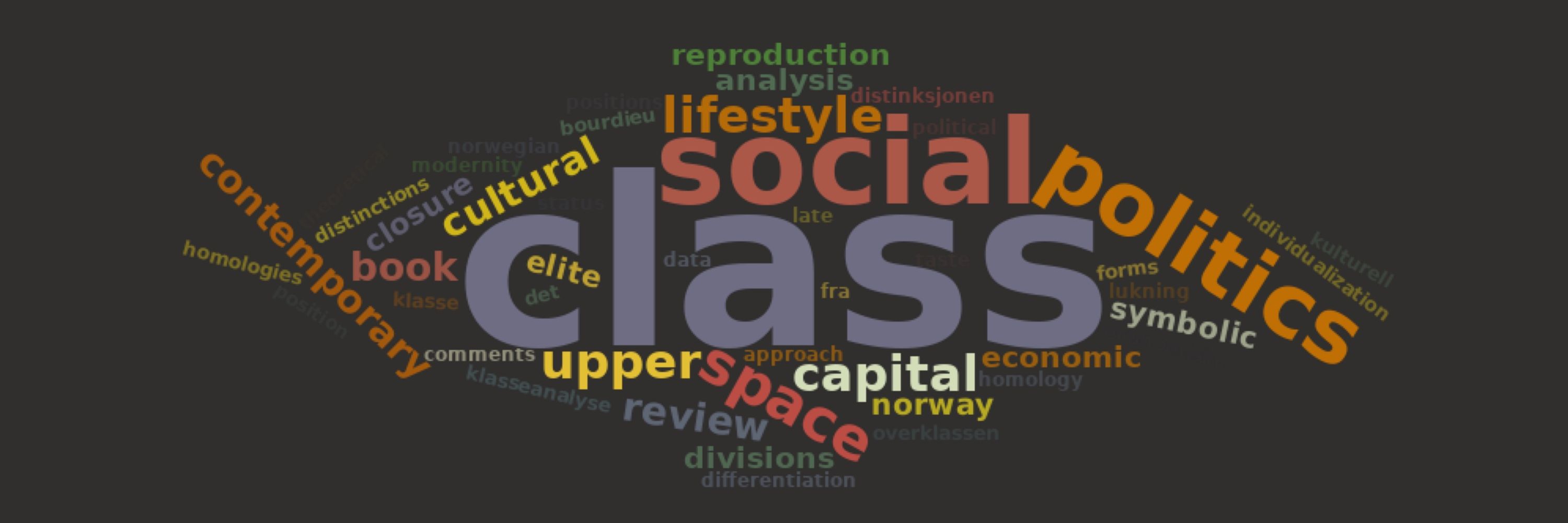
Magne P. Flemmen
@magneflemmen.bsky.social
Sociology prof at University of Oslo. Class, culture, politics, theory. Member of The European Center for the Study of Culture & Inequality. Associate editor, European Societies. Editorial board of ASR. Frank Parkin Appreciation Society.
Reposted by Magne P. Flemmen
Crucially, all these forms of critique coexist and often do not congeal into coherent left- or right-wing political worldviews: reacting to specific moral violations, the same workers will criticize politicians, the greedy rich, welfare scroungers, foreigners, bosses, and landlords.
September 9, 2025 at 2:48 PM
Crucially, all these forms of critique coexist and often do not congeal into coherent left- or right-wing political worldviews: reacting to specific moral violations, the same workers will criticize politicians, the greedy rich, welfare scroungers, foreigners, bosses, and landlords.
Reposted by Magne P. Flemmen
In terms of political representation, workers critique forms of political inequality and political exclusion: Politicians, as part of the upper class, only serve the upper class; and politics is a self-referential sphere closed to non-experts.
September 9, 2025 at 2:48 PM
In terms of political representation, workers critique forms of political inequality and political exclusion: Politicians, as part of the upper class, only serve the upper class; and politics is a self-referential sphere closed to non-experts.
Reposted by Magne P. Flemmen
In the domain of recognition, workers criticize violations of a hierarchy of deservingness whereby productive "makers" such as themselves are devalued vis-à-vis unproductive "takers"; as well as a devaluation of manual versus non-manual work. Both are based on a violated sense of "producers' pride".
September 9, 2025 at 2:48 PM
In the domain of recognition, workers criticize violations of a hierarchy of deservingness whereby productive "makers" such as themselves are devalued vis-à-vis unproductive "takers"; as well as a devaluation of manual versus non-manual work. Both are based on a violated sense of "producers' pride".
Reposted by Magne P. Flemmen
In terms of material distribution, workers critique injustices of social polarization (elites pull away while normal people are left behind); overexploitation (bosses maximize profit at workers’ expense), and market pressures (systemic competition squeezes everyone).
September 9, 2025 at 2:48 PM
In terms of material distribution, workers critique injustices of social polarization (elites pull away while normal people are left behind); overexploitation (bosses maximize profit at workers’ expense), and market pressures (systemic competition squeezes everyone).
Reposted by Magne P. Flemmen
Under these conditions, we show (re: EP Thompson, Axel Honneth, Barrington Moore) that the dominant form of workers' consciousness is a moral sense of injustice triggered by broken promises and hidden injuries. Its basic form is that of a protest against violations of an implicit social contract.
September 9, 2025 at 2:48 PM
Under these conditions, we show (re: EP Thompson, Axel Honneth, Barrington Moore) that the dominant form of workers' consciousness is a moral sense of injustice triggered by broken promises and hidden injuries. Its basic form is that of a protest against violations of an implicit social contract.
Oh this sounds great! Congrats!
September 9, 2025 at 8:43 PM
Oh this sounds great! Congrats!
Ja nei hva skal en si. Syns ikke det funka så bra på TV. Men jeg tror egentlig at det er noe i det med kjøttkaker, i den forstand at folks politiske preferanser er assosiert med massevis av kulturelle preferanser, bredt forstått. Der ville jeg tenke er fordi de bunner i det samme — habitus ☺️
September 3, 2025 at 11:15 PM
Ja nei hva skal en si. Syns ikke det funka så bra på TV. Men jeg tror egentlig at det er noe i det med kjøttkaker, i den forstand at folks politiske preferanser er assosiert med massevis av kulturelle preferanser, bredt forstått. Der ville jeg tenke er fordi de bunner i det samme — habitus ☺️
Jeg så det! Høy gåsehudfaktor. 50 Cent kan ta seg en bolle.
July 27, 2025 at 11:49 PM
Jeg så det! Høy gåsehudfaktor. 50 Cent kan ta seg en bolle.
Here’s a blog post summarising the paper: magneflemmen.com/2025/05/31/g...
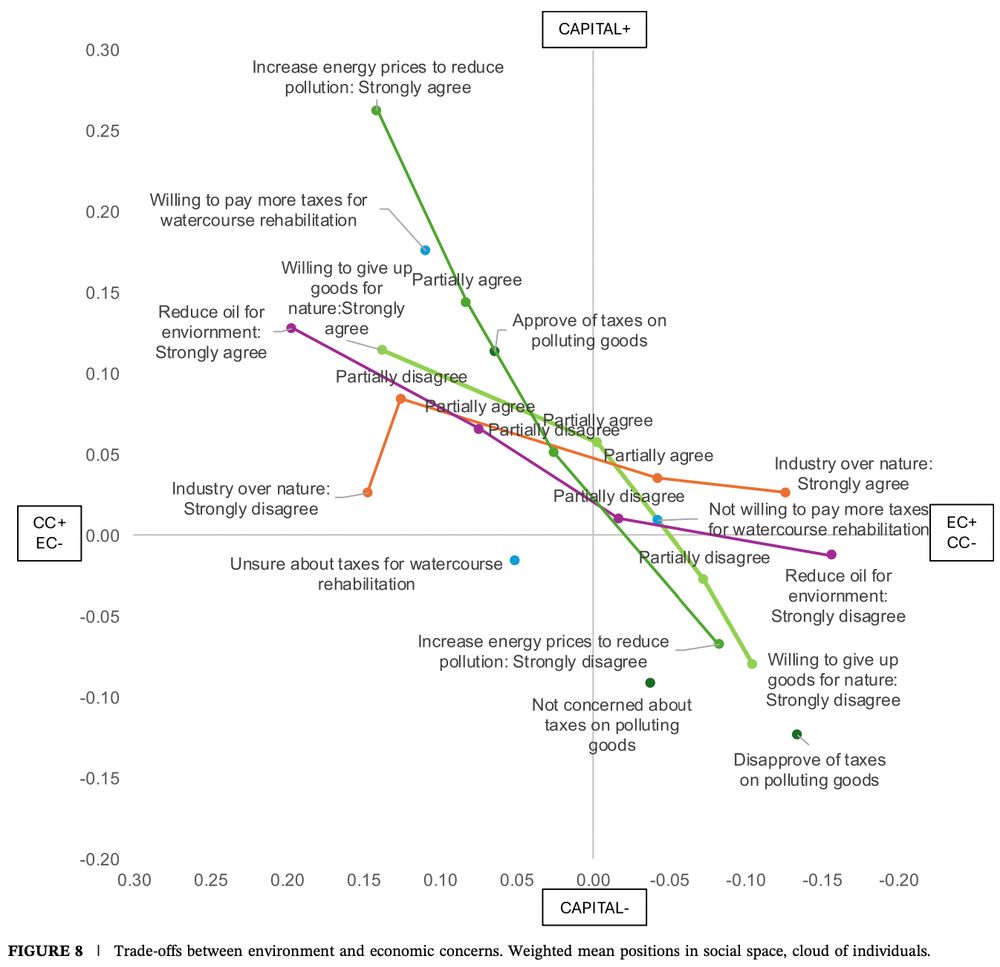
Green against greed: What my new paper says about class, cultural capital and environmental attitudes
Why are pro-environmental attitudes more common among the privileged? In a new article in The British Journal of Sociology, [free access version] I challenge three common explanations and propose a…
magneflemmen.com
May 31, 2025 at 7:35 PM
Here’s a blog post summarising the paper: magneflemmen.com/2025/05/31/g...
Takk! Syns dette var ganske bra, jeg! Liker spesielt at du blir konkret om hva et mer marxistisk perspektiv ville bidratt med her. Syns det er lett for at kritikken fra marxistisk hold stopper på konseptuelt plan, ved å vise til det teoretisk spesielle med utbytting. Men dette er nyttigere!
May 31, 2025 at 11:25 AM
Takk! Syns dette var ganske bra, jeg! Liker spesielt at du blir konkret om hva et mer marxistisk perspektiv ville bidratt med her. Syns det er lett for at kritikken fra marxistisk hold stopper på konseptuelt plan, ved å vise til det teoretisk spesielle med utbytting. Men dette er nyttigere!
If you don’t have access, try this one: onlinelibrary.wiley.com/share/author...
onlinelibrary.wiley.com
May 29, 2025 at 2:38 PM
If you don’t have access, try this one: onlinelibrary.wiley.com/share/author...
Thanks. Yes, here you go. onlinelibrary.wiley.com/share/author...
onlinelibrary.wiley.com
May 29, 2025 at 2:37 PM
Thanks. Yes, here you go. onlinelibrary.wiley.com/share/author...
Not sure about the generational thing specifically, but the age controls suggest older respondents here are more strongly pro-green on trade-off questions — give up goods to conserve nature, prioritise environment over industrial development, etc.
May 29, 2025 at 1:57 PM
Not sure about the generational thing specifically, but the age controls suggest older respondents here are more strongly pro-green on trade-off questions — give up goods to conserve nature, prioritise environment over industrial development, etc.
Thanks Dave! Be interested to hear your thoughts on this.
May 28, 2025 at 11:24 AM
Thanks Dave! Be interested to hear your thoughts on this.
So: environmentalism isn’t just an expression of privilege. It’s also a way of opposing a different kind of privilege.
Read more here onlinelibrary.wiley.com/doi/10.1111/... 🌱📊
Read more here onlinelibrary.wiley.com/doi/10.1111/... 🌱📊
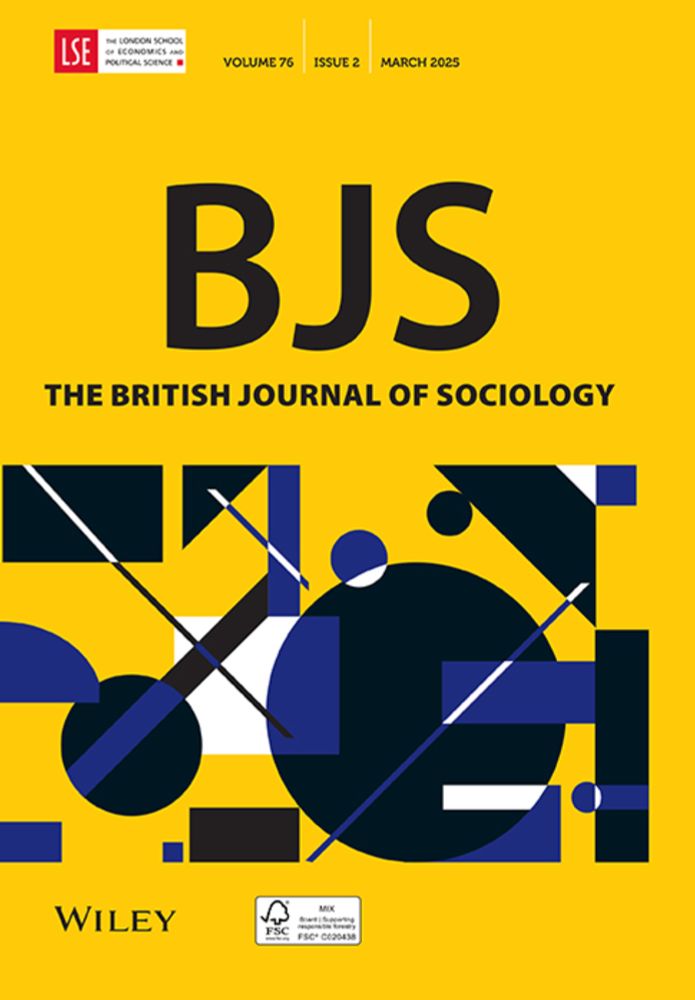
Green Against Greed: Negating Economic Capital Through Ecological Distinction
Pro-environmental attitudes are more prevalent among the affluent and educated, both across and within societies. However, the underpinnings of this pattern remain debated. Some scholars view environ...
onlinelibrary.wiley.com
May 28, 2025 at 10:50 AM
So: environmentalism isn’t just an expression of privilege. It’s also a way of opposing a different kind of privilege.
Read more here onlinelibrary.wiley.com/doi/10.1111/... 🌱📊
Read more here onlinelibrary.wiley.com/doi/10.1111/... 🌱📊
Backing this up: environmentalism is strongly tied to cultural taste that signal this anti-materialism. Control for taste, and much of the link between cultural capital and green views disappears.
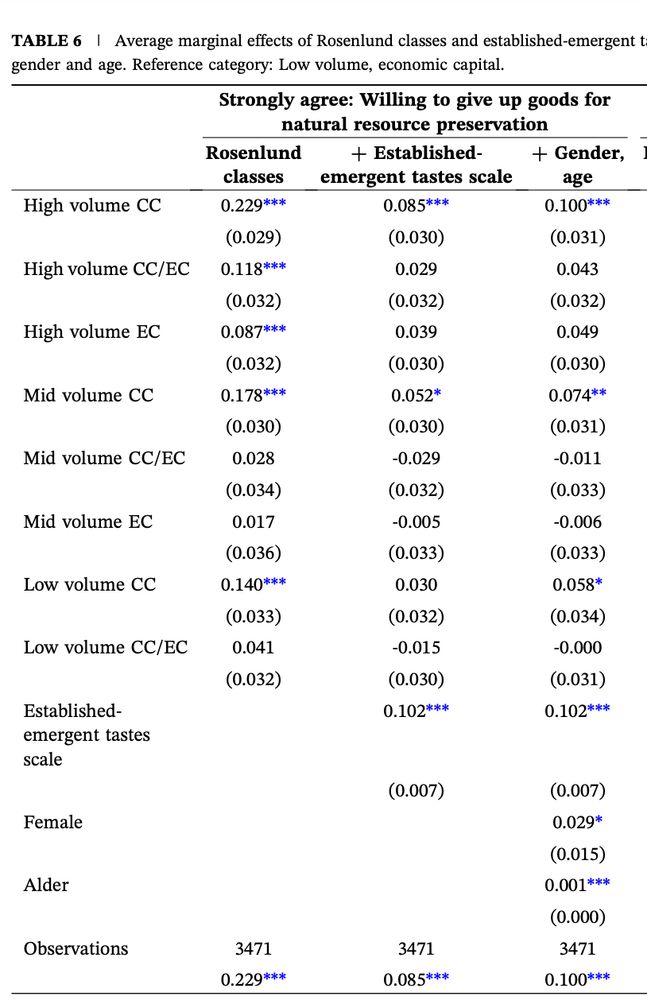
May 28, 2025 at 10:50 AM
Backing this up: environmentalism is strongly tied to cultural taste that signal this anti-materialism. Control for taste, and much of the link between cultural capital and green views disappears.
Instead, I suggest that green views function as a symbolic negation of economic capital – another way of distancing from materialism, excess, and the associated flashy and tacky lifestyles
May 28, 2025 at 10:50 AM
Instead, I suggest that green views function as a symbolic negation of economic capital – another way of distancing from materialism, excess, and the associated flashy and tacky lifestyles
Against “eco-habitus” theories, I show that the environmentalism of the culturally privileged is far from consistent. It’s selective, strategic – and shot through with ambivalence: only a minority sees it as an important factor in their voting.
May 28, 2025 at 10:50 AM
Against “eco-habitus” theories, I show that the environmentalism of the culturally privileged is far from consistent. It’s selective, strategic – and shot through with ambivalence: only a minority sees it as an important factor in their voting.
Against theories of “ecological distinction,” I argue that pro-green views aren’t just about standing out from the less privileged – they’re also a distancing from, nor negaiton of, economic capital and its values.
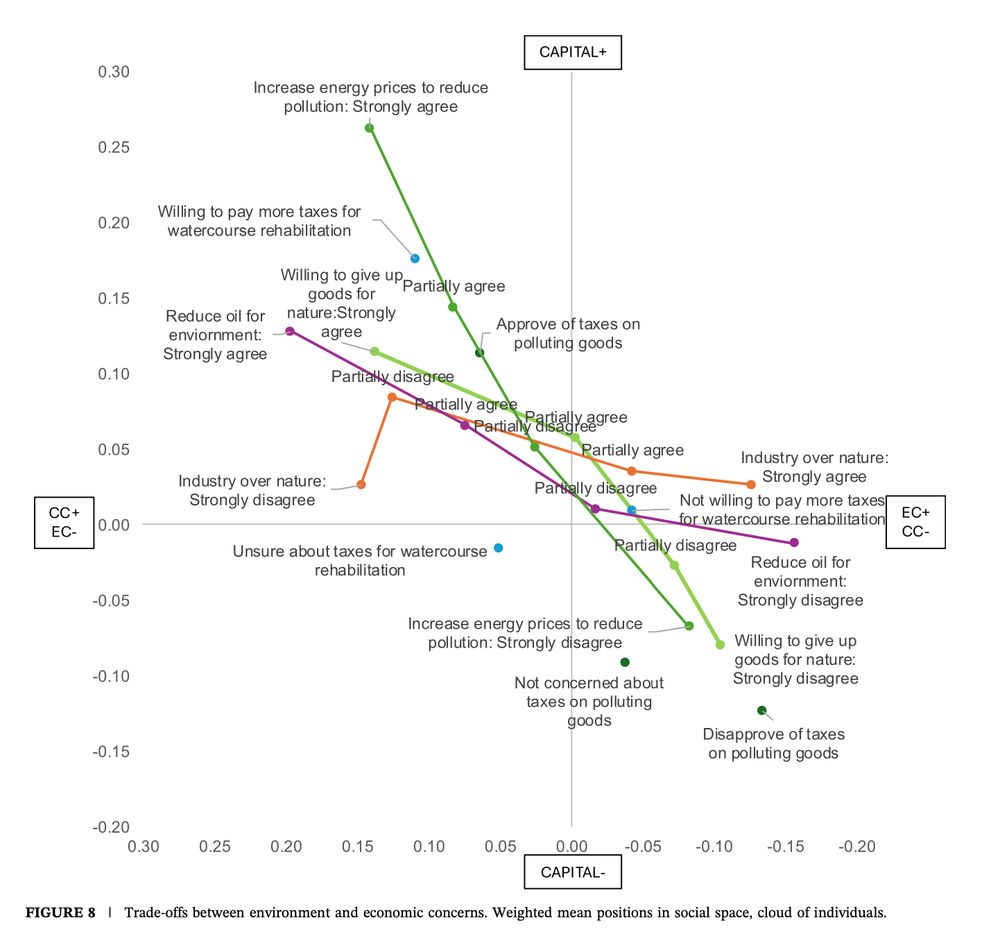
May 28, 2025 at 10:50 AM
Against theories of “ecological distinction,” I argue that pro-green views aren’t just about standing out from the less privileged – they’re also a distancing from, nor negaiton of, economic capital and its values.

